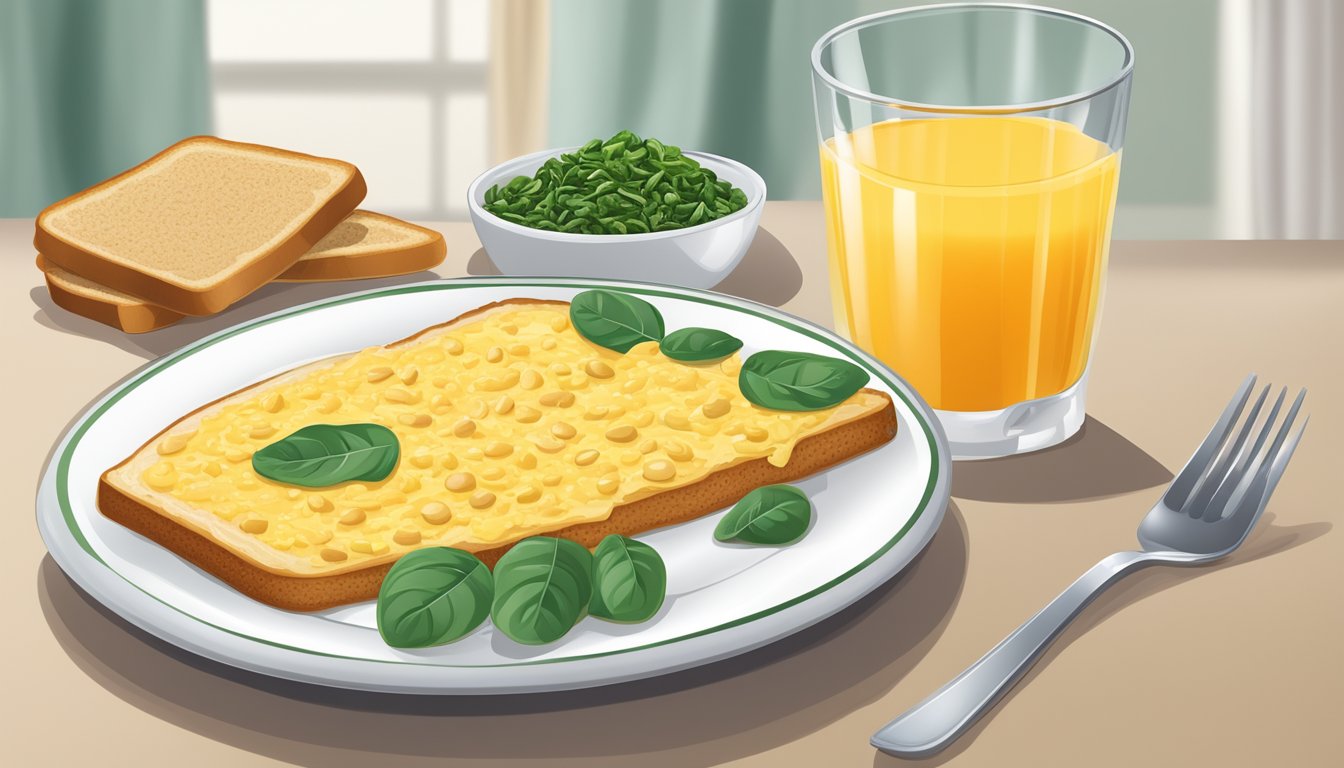Starting your day with iron-rich breakfast foods can boost energy levels and support overall health. Iron plays a crucial role in transporting oxygen throughout the body and maintaining a strong immune system. Many common breakfast foods are excellent sources of iron, including whole grain cereals, eggs, lean meats, and certain seeds and nuts.
Incorporating iron-rich ingredients into your morning meal doesn’t have to be complicated. Simple options like a bowl of fortified cereal with milk, a spinach and mushroom omelet, or whole grain toast with peanut butter can provide a significant portion of your daily iron needs. For those following plant-based diets, foods like quinoa, legumes, and tofu can be prepared in various breakfast dishes to increase iron intake.
Pairing iron-rich foods with vitamin C-rich ingredients can enhance iron absorption. Adding sliced strawberries to your cereal or drinking a glass of orange juice with your breakfast can help maximize the benefits of iron-rich foods. By making thoughtful choices about breakfast ingredients, it’s possible to create delicious and nutritious meals that support your body’s iron requirements.
Understanding Iron in Nutrition

Iron plays a crucial role in human health and nutrition. This essential mineral is vital for various bodily functions and maintaining overall well-being.
Role of Iron in the Body
Iron is a key component of hemoglobin, the protein in red blood cells responsible for transporting oxygen throughout the body. It helps deliver oxygen to muscles, organs, and tissues, supporting energy production and cellular function.
Iron is also essential for the immune system, helping to defend against infections and diseases. It supports cognitive function, aiding in brain development and maintaining mental acuity.
Additionally, iron is involved in the production of certain hormones and connective tissues. It plays a part in DNA synthesis and cell division, making it crucial for growth and development.
Types of Dietary Iron
Dietary iron comes in two forms: heme and non-heme iron. Heme iron is found exclusively in animal products such as meat, poultry, and fish. It is more easily absorbed by the body, with an absorption rate of 15-35%.
Non-heme iron is present in plant-based foods like leafy greens, legumes, and fortified cereals. It has a lower absorption rate of 2-20%. The body absorbs non-heme iron less efficiently, but it remains an important source for many people, especially those following plant-based diets.
Some foods high in heme iron include:
- Lean beef
- Chicken liver
- Oysters
- Sardines
Non-heme iron sources include:
- Spinach
- Lentils
- Tofu
- Fortified breakfast cereals
Iron Absorption and Bioavailability
Several factors affect iron absorption and bioavailability. Vitamin C enhances iron absorption, particularly non-heme iron. Consuming vitamin C-rich foods like citrus fruits, bell peppers, or strawberries with iron sources can significantly improve uptake.
Certain compounds can inhibit iron absorption. Phytates found in whole grains and legumes, and tannins in tea and coffee can reduce iron bioavailability. Calcium may also interfere with iron absorption when consumed in large amounts.
Cooking in cast iron cookware can increase the iron content of foods, especially acidic dishes. This method can be particularly beneficial for those at risk of iron deficiency.
Consequences of Iron Deficiency
Iron deficiency can lead to anemia, a condition characterized by a lack of healthy red blood cells. Symptoms of iron deficiency anemia include:
- Fatigue and weakness
- Pale skin
- Shortness of breath
- Headaches
- Dizziness
Prolonged iron deficiency can impair cognitive function, affecting memory and concentration. It may also weaken the immune system, making individuals more susceptible to infections.
In pregnant women, iron deficiency can lead to complications such as premature birth or low birth weight. In children, it can hinder growth and development.
Regular iron intake through diet or supplements, as recommended by healthcare professionals, can help prevent these consequences and maintain optimal health.
Top Iron-Rich Foods for Breakfast

Incorporating iron-rich foods into your breakfast routine can significantly boost your daily iron intake. Both animal and plant-based sources provide options for various dietary preferences and needs.
Animal-Based Iron Sources
Eggs are an excellent source of heme iron, with one large egg containing about 0.9 mg. Scrambled eggs or omelets offer versatile options for a hearty breakfast. Lean meats like beef and pork can be included in breakfast dishes, providing substantial amounts of iron.
A serving of beef sausage or a small steak can offer up to 2-3 mg of iron. Poultry, such as chicken or turkey, can be added to breakfast sandwiches or wraps for an iron boost. Seafood lovers can enjoy smoked salmon or sardines on toast, both rich in heme iron.
Plant-Based Iron Sources
Oatmeal is a popular breakfast choice high in iron, with a cup of cooked oats containing about 2 mg. Adding nuts like almonds or seeds such as pumpkin seeds can further increase iron content. Chia seeds are particularly iron-rich and can be sprinkled on yogurt or added to smoothies.
Tofu scramble is a vegan alternative to eggs, providing a good amount of non-heme iron. Quinoa can be prepared as a warm breakfast cereal or added to breakfast bowls. Leafy greens like spinach and kale can be incorporated into smoothies or sautéed as a side dish.
Lentils can be used in savory breakfast dishes or spreads. Whole grain toast with almond butter offers a quick iron-rich option for busy mornings.
Iron-Enhancing Foods to Include in Breakfast
Pairing iron-rich foods with vitamin C and other nutrient-dense options can significantly boost iron absorption. A balanced breakfast combining these elements provides a powerful start to the day.
Foods Rich in Vitamin C
Vitamin C plays a crucial role in enhancing iron absorption. Citrus fruits like oranges and grapefruits are excellent sources. A glass of fresh orange juice or grapefruit segments can complement iron-rich breakfast foods.
Bell peppers, particularly red ones, are packed with vitamin C. Add them to omelets or breakfast burritos. Strawberries offer a sweet vitamin C boost. Top cereals or yogurt with these berries for a nutritious twist.
Tomatoes are versatile and rich in vitamin C. Include them in savory breakfast dishes like scrambled eggs or avocado toast. For a quick vitamin C fix, blend spinach, banana, and orange juice into a green smoothie.
Additional Nutrient-Rich Foods
Nuts and seeds provide iron along with healthy fats and fiber. Sprinkle pumpkin seeds on oatmeal or add almond butter to whole-grain toast. These options offer a satisfying crunch and nutrient boost.
Avocado toast has gained popularity as a nutritious breakfast. Avocados contain healthy fats that aid in nutrient absorption. Top with sliced tomatoes for added vitamin C.
Protein sources like eggs, lean meats, and plant-based alternatives contribute to a balanced breakfast. Pair these with vitamin C-rich foods to maximize iron absorption. A spinach and mushroom omelet with sliced bell peppers offers a perfect combination.
Ideal Breakfast Recipes Incorporating High-Iron Foods
Starting your day with iron-rich breakfast foods can significantly boost your energy levels and overall health. These recipes combine delicious flavors with nutritious ingredients to help meet your daily iron requirements.
Classic Breakfast Dishes
Spinach and feta omelette is a tasty way to incorporate iron-rich leafy greens into your morning meal. Pair it with whole-grain toast for added nutrients. A breakfast burrito filled with black beans, scrambled eggs, and spinach offers a hearty dose of iron. For a simpler option, boiled eggs served with whole-wheat bread and a side of baked beans provide a good iron boost.
Fortified cereals are an excellent source of iron. Choose varieties with minimal added sugars and serve with milk or a plant-based alternative. Top with raisins or blueberries for extra flavor and nutrients.
Innovative Breakfast Ideas
Quinoa breakfast bowls offer a unique twist on traditional morning meals. Cook quinoa in milk or plant-based milk, then top with nuts, seeds, and fresh fruits. This combination provides a good amount of iron along with other essential nutrients.
Chia seed pudding is another innovative option. Prepare it the night before by mixing chia seeds with milk and letting it set overnight. In the morning, add iron-rich toppings like pumpkin seeds or dried fruits.
For a savory option, try a tofu scramble with spinach and nutritional yeast. This vegan-friendly dish is packed with iron and protein.
Quick and Easy Breakfast Options
Overnight oats are perfect for busy mornings. Mix oats with milk, add fruits and nuts, and refrigerate overnight. In the morning, you’ll have a ready-to-eat, iron-rich breakfast.
Smoothies are another quick option. Blend spinach, banana, and your choice of milk for a refreshing iron-packed drink. Add a scoop of peanut butter for extra iron and protein.
Whole-grain toast with peanut butter and sliced banana is a simple yet effective way to increase iron intake. For extra nutrition, sprinkle some chia seeds or hemp hearts on top.
Supplementing Breakfast with Iron for Specific Diets
Tailoring iron-rich breakfast options to dietary preferences ensures adequate intake for both plant-based eaters and meat consumers. Balanced meal choices can meet iron needs across various eating styles.
Plant-Based Iron-Rich Options
Tofu scrambles provide a protein-packed, iron-rich breakfast. Add spinach or kale for an extra iron boost. Chia seed puddings offer another convenient option, with 1 ounce containing 2 mg of iron.
Lentil-based breakfast bowls combine protein and iron. Top with vitamin C-rich fruits to enhance absorption. Quinoa porridge serves as a complete protein source with notable iron content.
Leafy green smoothies blend nutrition and convenience. Mix spinach or Swiss chard with fruits for a tasty, iron-fortified drink. Plant-based milk fortified with iron can be used in cereals or smoothies.
Options for Meat Eaters
Lean beef hash delivers a substantial iron dose. Pair with bell peppers for vitamin C to maximize absorption. Eggs, while moderate in iron, offer versatility in breakfast dishes.
Chicken or turkey sausages provide lean protein and iron. Combine with whole-grain toast for a balanced meal. Iron-fortified cereals topped with berries create a quick, nutritious option.
Grilled fish like salmon or tuna can be incorporated into breakfast wraps. Pork tenderloin, when prepared in advance, makes for an iron-rich breakfast meat. Serve with fruit for a complete morning meal.




